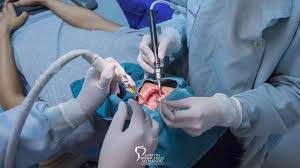The Importance of Dental Surgery for Oral Health
Dental surgery plays a crucial role in maintaining good oral health and addressing various dental issues that may arise. From routine procedures like tooth extractions to more complex surgeries such as dental implants, these interventions are essential for preserving the health and functionality of your teeth and gums.
One common type of dental surgery is wisdom tooth extraction. Wisdom teeth, also known as third molars, often cause problems such as impaction, crowding, or infection. Removing these teeth through surgery can prevent pain, swelling, and potential damage to surrounding teeth.
Another important dental surgery is root canal treatment. This procedure involves removing infected or damaged pulp from inside a tooth to alleviate pain and save the tooth from extraction. Root canal surgery can help preserve natural teeth and restore normal oral function.
Dental implants are a popular surgical option for replacing missing teeth. Implants provide a durable and natural-looking solution that improves both aesthetics and functionality. By surgically placing an artificial tooth root in the jawbone, implants offer a long-term replacement for missing teeth.
Orthognathic surgery is another type of dental surgery that focuses on correcting jaw misalignments or irregularities. This procedure can improve bite function, facial symmetry, and overall oral health. Orthognathic surgery may be recommended for patients with severe malocclusions or skeletal discrepancies.
Overall, dental surgery is an integral part of comprehensive dental care that addresses a wide range of oral health issues. Whether you require a simple extraction or a complex reconstructive procedure, consulting with a qualified oral surgeon can help you maintain optimal oral health and achieve a confident smile.
“Assessing Pain Levels Associated with Dental Surgery”
“Exploring the Terminology: What is a Dental Surgery Practice?”
4. “Defining Dental Surgery: Procedures and
- What is the most common dental surgery?
- How painful is dental surgery?
- What is a dentist surgery called?
- What is meant by dental surgery?
- What is used for dental surgery?
- What is the difference between oral surgery and dental surgery?
What is the most common dental surgery?
The most common dental surgery is tooth extraction. Tooth extraction is a routine procedure performed by dentists or oral surgeons to remove a tooth that is damaged, decayed, infected, or causing other dental issues. This type of surgery may be necessary to alleviate pain, prevent infection from spreading, create space for orthodontic treatment, or address impacted wisdom teeth. Tooth extraction is a relatively straightforward procedure that is often performed under local anaesthesia to ensure patient comfort and safety. It is important to follow post-operative care instructions provided by the dental professional to promote proper healing and minimise any potential complications.
How painful is dental surgery?
The level of pain experienced during dental surgery can vary depending on the type of procedure, individual pain tolerance, and the effectiveness of anaesthesia used. While some patients may feel minimal discomfort or pressure during certain dental surgeries, others may experience mild to moderate pain that can be managed with appropriate pain relief medication prescribed by the dentist. It is important to communicate openly with your dental surgeon about any concerns regarding pain management before and after the procedure to ensure a comfortable and successful surgical experience.
What is a dentist surgery called?
A dentist surgery is commonly referred to as a dental practice or a dental clinic. This is where qualified dentists and oral health professionals provide a range of dental services, including routine check-ups, cleanings, fillings, and more complex procedures such as root canals or tooth extractions. The term “dentist surgery” encompasses the physical location where dental care is provided, emphasizing the importance of maintaining oral health through regular visits to a trusted dental practice.
What is meant by dental surgery?
Dental surgery refers to a specialized branch of dentistry that involves surgical procedures to address various oral health issues. These procedures may range from routine interventions like tooth extractions and root canals to more complex surgeries such as dental implants and orthognathic surgery. Dental surgery aims to treat conditions affecting the teeth, gums, jaw, and surrounding structures through surgical techniques performed by trained oral surgeons. By combining expertise in both dentistry and surgery, dental surgeons can effectively diagnose, treat, and manage a wide range of dental problems to improve overall oral health and restore optimal function and aesthetics.
What is used for dental surgery?
In dental surgery, a variety of tools and equipment are used to perform procedures with precision and efficiency. Common instruments include dental drills, which are used to remove decayed tissue and shape teeth, as well as forceps for extracting teeth. Additionally, specialised tools such as scalers and curettes are utilised for cleaning teeth and gums during procedures like root planing and scaling. Local anaesthetics are administered to numb the area being treated, ensuring patient comfort throughout the surgery. Advanced technologies like dental lasers may also be employed for certain procedures to enhance precision and reduce discomfort. Dental surgeons rely on a combination of traditional instruments and modern innovations to deliver high-quality care during surgical interventions.
What is the difference between oral surgery and dental surgery?
The key difference between oral surgery and dental surgery lies in their scope and focus. Oral surgery encompasses a broader range of surgical procedures that involve the mouth, jaws, and facial regions beyond traditional dental treatments. This specialty often deals with more complex issues such as jaw realignment, facial trauma repair, and oral pathology management. On the other hand, dental surgery typically refers to surgical interventions specifically related to teeth and gums within the oral cavity. These procedures commonly include tooth extractions, root canals, dental implants, and gum surgeries aimed at addressing various dental conditions. While both disciplines share a common goal of improving oral health, oral surgery tends to tackle more intricate cases that extend beyond routine dental care.

